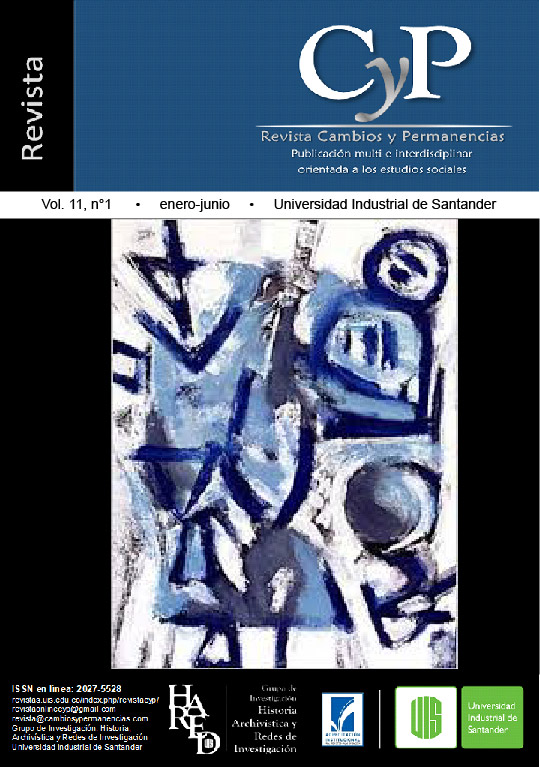Published 2020-06-30
Keywords
- socialization,
- orality,
- seeds of life,
- ancestral knowledge
How to Cite
Abstract
The research carried out with the sabedores[1] of the people Nasa of Sa'th Tama Kiwe - Caldono, Cauca, revolved around the tension in the indigenous peoples between autonomously educating their children, from the principles and cosmological values or from the orientations of Western thought. The general objective was to identify communally the most significant elements of primary socialization of girls and boys, their processes of identification and cultural self-determination. The road travelled made it possible to place in tension the dominant notions of primary socialization, with the cultural category of seeds of life, between individual well-being and another process that seeks dignified life in harmony with Mother Earth. The work was from the dialogue of knowledge - mingas[2] of thought, spaces of ritualized encounter with others, this communicates knowledge, senses, dreams; according to Borda, sentipensamientos allows us to build and recreate knowledge in order to face the situations of inequality and injustice that affect the peoples of the South. The research resumed on the need to establish popular and indigenous knowledge walking the word of life
[1] Sabedores: Who knows a certain thing or has the knowledge about it.
[2] Mingas: meetings
Downloads
References
Asociación de Cabildos Ukawe’sx Nasa Cxhab (2013). Política indígena despertar de las semillas. Caldono, Cauca, Colombia: Asocabildos.
Asociación de Cabildos Ukawe’sx Nasa Cxhab (2016). Mingas de Pensamiento, Semillas de Vida Sa’th Tama Kiwe. Caldono, Cauca, Colombia.
Bermúdez, F. M., y Núñez, K. (2009). Socialización y aprendizaje infantil en un contexto intercultural. Una etnografía educativa en el Bascán en la región cho’l de Chiapas. México: Universidad de Ciencias y Artes de Chiapas.
Coordinadora Andina de Organizaciones Indígenas – CAOI- (2010). Buen Vivir / Vivir Bien, Filosofía, políticas, estrategias y experiencias regionales andinas. Lima, Perú: Tercera edición.
Díaz, A. (2016). Entrevistado por Useda, H. Proceso de la estrategia semillas de vida. Caldono, Cauca, Colombia.
Díaz, M. (1988). Socialización, Sociabilización y Pedagogía. Revista Maguaré, 6(7). Recuperado de http://www.revistas.unal.edu.co/index.php/maguare/article/view/14221/15009 .
Fals Borda, O. (2009). Una sociología sentipensante para América Latina. Antología y presentación Víctor Manuel Moncayo. Bogotá, Colombia: Siglo del Hombre Editores, CLACSO. Recuperado de http://bibliotecavirtual.clacso.org.ar/ar/libros/coedicion/fborda/fborda.pdf
Instituto Colombiano de Bienestar Familiar ICBF. (2010). Minutas con enfoque diferencial. Recuperado de http://www.icbf.gov.co/portal/page/portal/PortalICBF/Bienestar/Nutrición/MINUTASCONENFOQUEDIFERENCIAL-ICBFetnica.pdf
Peña, V. (2011). ¿Qué es una política pública y para qué sirve?, ¿Cómo protegemos a nuestros niños y nuestras niñas nasa? Defender y cuidar nuestros niños y niñas semillas. Memorias: Foro de Políticas Públicas para la Niñez Indígena Nasa, Caldono, Cauca, Colombia.
Peña, V. (2016). Entrevistado por Useda, H. Minga de pensamiento 2. Caldono, Cauca, Colombia: Semillas de Vida.
Por el cual se crea un régimen especial con el fin de poner en funcionamiento los Territorios Indígenas respecto de la administración de los sistemas propios de los pueblos indígenas hasta cuando el Congreso expida la ley de la que trata el artículo 329 de la Constitución Política, Decreto 1953, Ministerio del Interior. Colombia. (2014).
Santos, B (2005). Hacia una sociología de las ausencias y una sociología de las emergencias. En (S. A.), El milenio huérfano. Ensayos para una nueva cultura política. Madrid, España: Trotta.
Yujo, S. (2015). Entrevistado por Useda, H. Minga de pensamiento. Caldono, Cauca, Colombia: Semillas de Vida.

